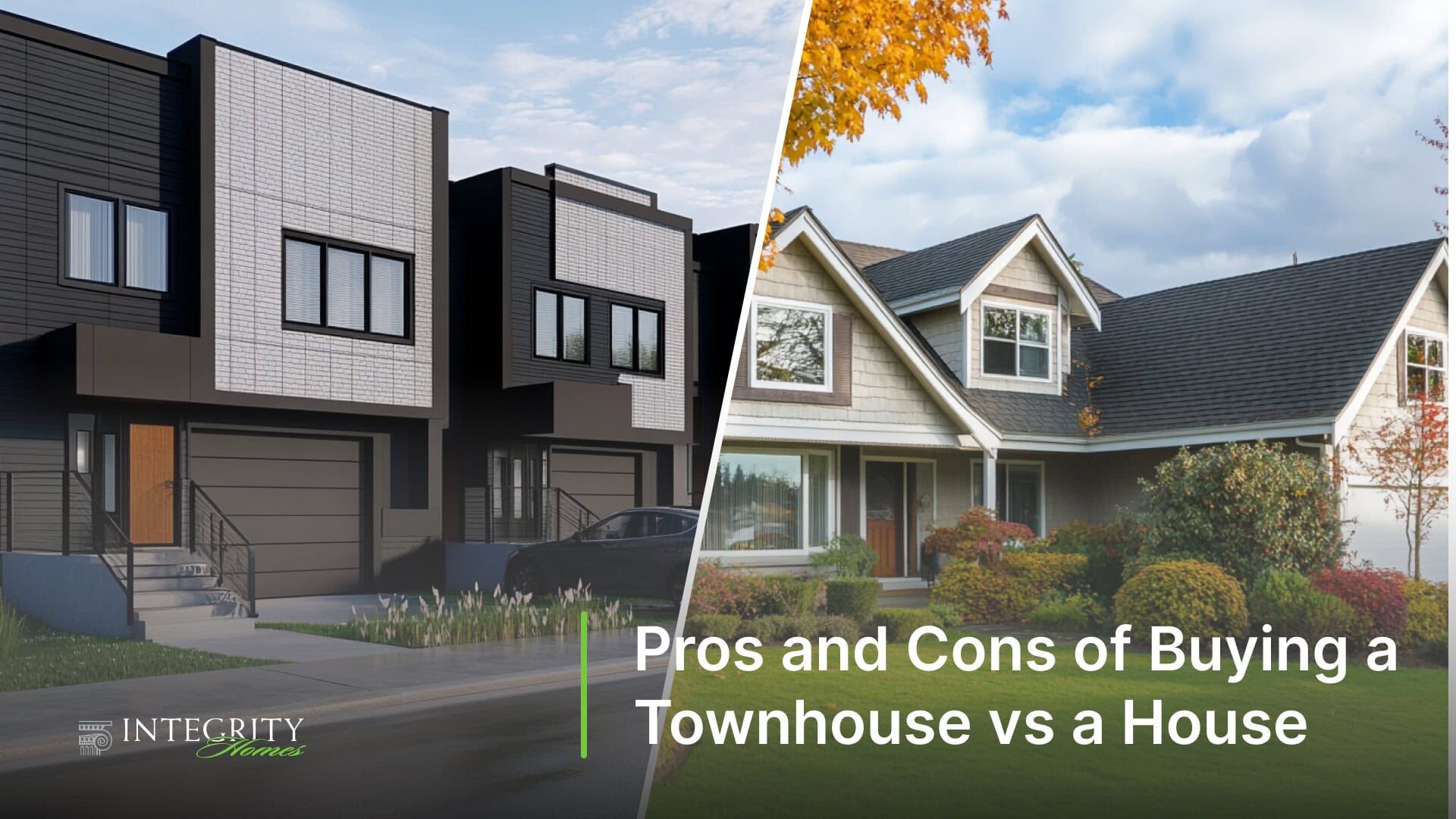
Should you buy a townhouse or a house? This guide on the pros and cons of buying a townhouse vs a house covers privacy, maintenance, costs, and space. We’ll help you decide by examining what each option offers and its trade-offs.
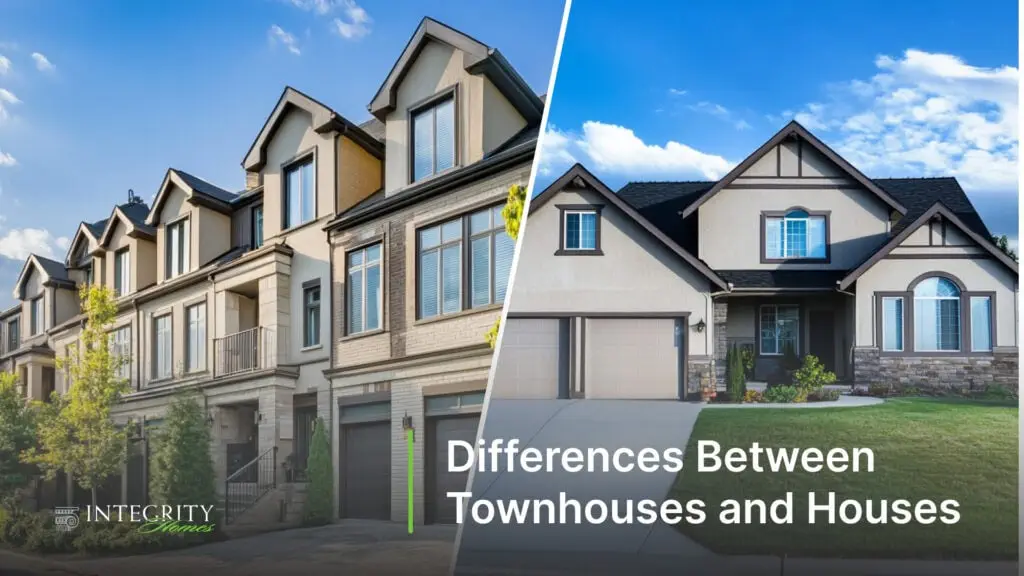
The primary distinction between a townhouse and a standalone house lies in their construction. Townhouses are built in rows, where each unit shares walls with its neighbors, while houses are detached structures offering increased freedom and privacy. This crucial difference notably influences the structure of living concerning aspects such as space, privacy, upkeep, and financial implications.
Townhouses are commonly structured in sequences with adjoining exterior walls, which leads to efficient use of the available land despite creating more condensed living areas that usually extend over multiple stories. This configuration may restrict the amount of outdoor space.
On the other hand, detached houses stand alone without any shared walls, providing ample space surrounding them and enhanced privacy due to their freestanding nature.
The duties of property upkeep vary significantly when comparing townhouses to single-family homes. Those who own a townhouse must tend to the maintenance needs both inside and outside their residence, usually adhering to the stipulations set by their homeowners association (HOA).
On the other hand, owners of a single-family home bear complete responsibility for maintaining their property. This provides them with greater autonomy in terms of upkeep, but also means they face larger responsibilities regarding maintenance tasks.

The financial aspect is a critical factor when making a choice. Typically, townhouses are priced lower than single-family homes, which makes them attractive to those who are mindful of their budget.
Nevertheless, it’s important to take into account not just the initial purchase price, but also recurrent expenses such as mortgage installments, property taxes, homeowners association (HOA) fees, and any other monthly fees associated with ownership.
Is a townhouse a single family home? Compared to single-family homes, townhouses are often more affordable due to their lower purchase price. This feature can be particularly advantageous for first-time homebuyers struggling with accumulating a substantial down payment required for pricier homes. The associated property taxes on townhouses tend to be less daunting, easing the initial financial strain on purchasers.
Although houses command a higher purchase price, they compensate by providing greater living areas and additional land. Typically, securing a house necessitates around a 20% down payment, which can profoundly impact affordability considerations. When contemplating these upfront expenses, it’s crucial to balance them against your long-term fiscal ambitions and budgetary constraints.
When buying a home, the purchase price not only determines the size of your down payment and loan amount, but also affects your monthly mortgage payments and property taxes. A higher purchase price means you’re likely to face greater ongoing costs such as elevated property taxes. It is crucial to take into account these sustained financial obligations when deciding between different types of properties like townhouses or houses.
Owners of townhouses should be mindful that paying HOA fees is an important aspect of their expenses. These fees often encompass a variety of services such as upkeep for shared spaces, insurance coverage, landscaping needs, and waste removal. The convenience offered by these collective maintenance efforts can alleviate the individual responsibilities faced by homeowners. Nevertheless, it’s imperative to account for these additional costs when managing your budget dedicated to HOA payments.
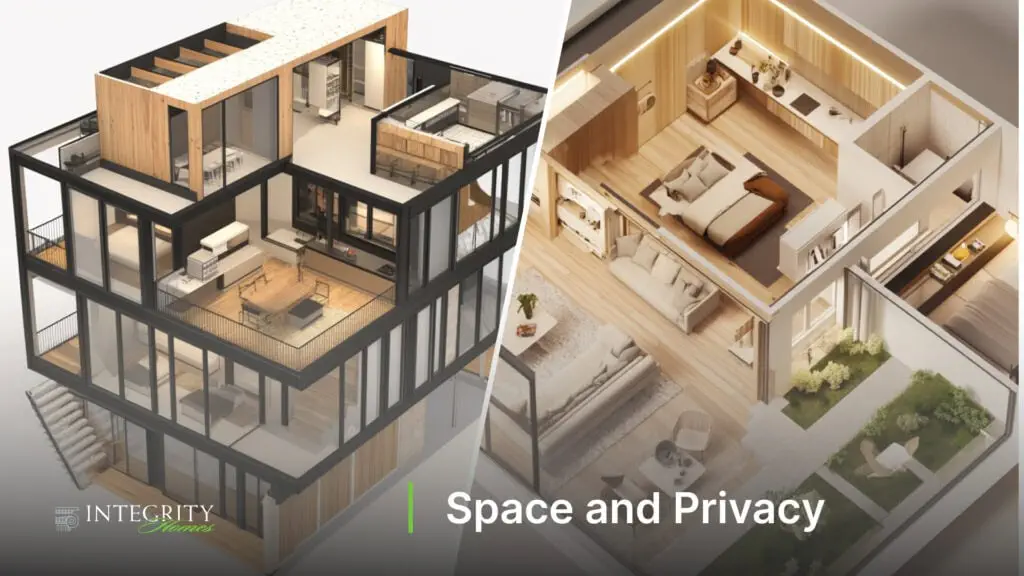
In the discussion regarding a townhouse versus a house, living space and privacy play crucial roles. A townhouse usually involves having shared walls with neighbors, potentially reducing the level of privacy one might enjoy to a detached home.
Conversely, standalone homes often come with increased living space and additional outdoor areas, affording residents more personal freedom and private seclusion.
Single-family homes typically offer more extensive living spaces, which may include additional rooms and greater square footage. This expanded area is especially advantageous for individuals or families who require extra space for their activities.
Conversely, townhouses frequently have multiple floors but tend to provide smaller amounts of square footage in comparison. These properties are thus better suited for people who demand a more compact living area.
Community areas or a modest yard often comprise the outdoor space of townhouses, which might not suffice for individuals with pets or those keen on expansive gardening.
In contrast, single-family homes provide an ample amount of outdoor space along with the liberty to alter it as desired. This extra room allows for privacy and is beneficial to families.
When deliberating whether to opt for a townhouse or a detached house, the aspect of privacy plays an essential role. The fact that townhouses often come with shared walls means there is less privacy than in standalone houses where such common boundaries with neighboring homes are absent. Hence, if one’s priority is greater solitude and seclusion, choosing a detached home over a townhouse could be more advantageous due to the absence of shared walls.
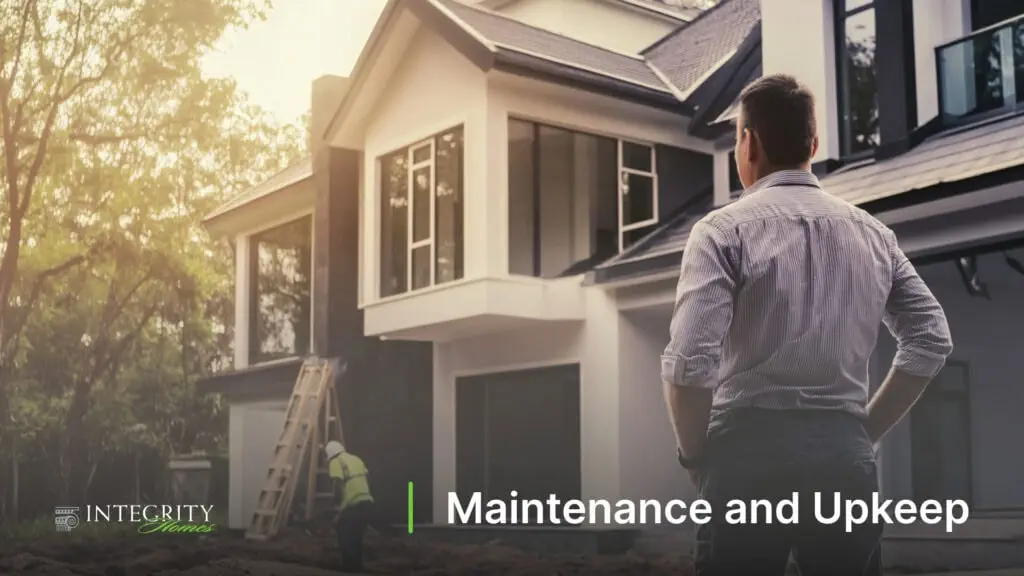
Owners of townhouses typically enjoy the advantage of community assistance with exterior maintenance, whereas those who own standalone houses bear the sole responsibility for all areas of upkeep. This can be seen as both a benefit and an obligation for homeowners living in detached residences.
Owners of townhouses must tend to the upkeep of their home’s exterior. This duty is frequently mitigated by homeowners associations (HOAs) that typically undertake such maintenance. While this can lighten the load for owners, it might also restrict their capacity to personalize the outside look owing to HOA regulations.
On the other hand, individuals owning detached houses bear sole responsibility for all aspects of exterior maintenance and repairs. This affords them greater autonomy in how they manage their property, but necessitates a more significant personal commitment to its care.
Typically, townhouse owners are responsible for the upkeep of both their unit’s interior and exterior. Such ownership can lead to reduced maintenance expenses when compared with single-family homes where homeowners bear sole responsibility for all aspects of property care.
Purchasing a townhouse frequently involves less managerial duties since much of the maintenance is collective and overseen by homeowners’ associations.
Communal outdoor spaces in townhouses are typically more compact, restricting residents’ room for recreational activities and gardening. This reduction in personal space can make it challenging for individuals to perform tasks like lawn care and snow removal that are commonly associated with the maintenance of larger private exteriors found in detached homes.
The constraints on available outdoor areas may alter the quality of living within a townhouse setting, possibly rendering it less attractive to those who place high importance on having substantial outdoor spaces at their disposal.
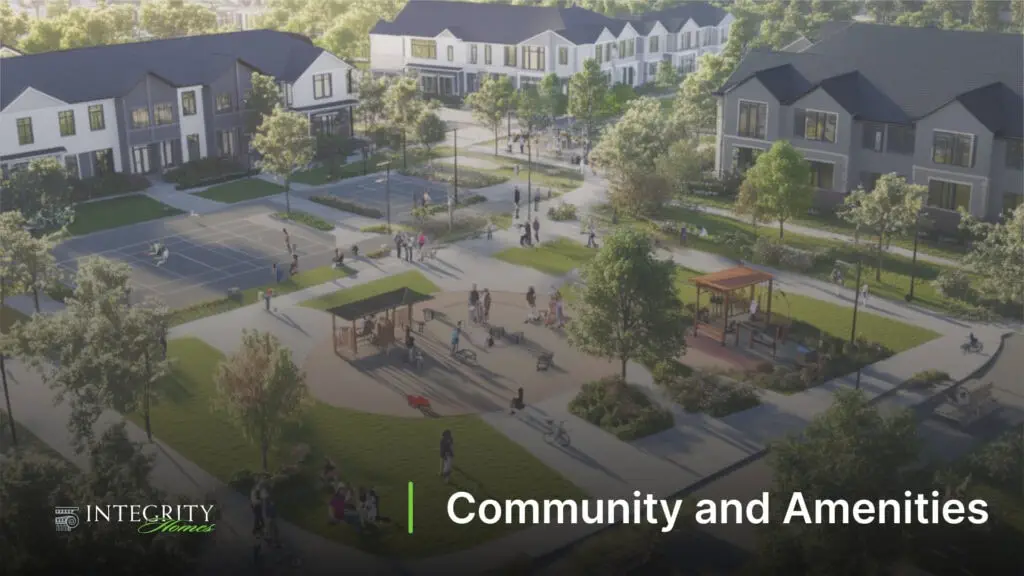
Living in townhouses or houses comes with the significant benefits of community and amenities. Townhouse communities frequently offer communal facilities such as gyms and tennis courts, which not only allow residents easy access to recreational activities, but also promote a strong sense of camaraderie.
The presence of shared amenities serves as a catalyst for social engagement among inhabitants, thereby enriching the essence of community life.
Owners of townhouses often benefit from communal facilities including manicured green spaces, swimming pools, and areas designated for recreation. These features are looked after by the Homeowners Association (HOA), reducing the burden on individual owners to maintain these amenities themselves and providing them with additional time for relaxation.
Yet, the existence of these collective spaces requires that those owning townhouses comply with regulations set forth by their HOA. Such rules might restrict some aspects of personal autonomy concerning property use.
Typically situated in city environments, townhouses grant easy access to amenities and public transportation. Residents enjoy the sense of community these urban dwellings provide along with the proximity to urban perks, which makes them appealing for individuals who prefer a vibrant atmosphere.
Conversely, single-family homes tend to be placed within suburban locales where they afford greater privacy and ample space. This often necessitates increased dependence on personal vehicles for travel and daily tasks.
In townhouse communities, homeowners associations enforce guidelines designed to preserve the community’s aesthetics and property values. These include restrictions on changes to external features and directives for landscaping, which may limit how much residents can customize their homes.
Although these rules contribute to improving the collective look and value of the neighborhood, they can also impinge on personal liberties.

When deciding whether to purchase a townhouse or a single-family home, the investment potential and the ability to resell at a higher value should be taken into account. Townhouses often have stronger resale values than houses, which can make them more rewarding as investments.
It’s important to note that local real estate market conditions significantly affect how much townhomes appreciate in value over time, and these trends might differ from those impacting single-family homes.
In areas where the desire for medium density housing is high, townhomes can see considerable appreciation in value. Despite this potential growth, townhouses often appreciate at a rate that may be less than that of single-family homes. Single-family homes are typically sought after due to their more spacious and private nature, which tends to make them more appealing in the real estate market.
Townhouses may be favored by investors for the reduced upkeep they require and the possibility of being able to sell them more rapidly.
Owing to their expansive dimensions and increased seclusion, single-family houses could stand as superior investment assets due to their enhanced potential for appreciation over a longer period.

When choosing between a townhouse and a house, it’s essential to consider your lifestyle, what you will need in the future, and what suits your personal tastes.
For example, townhouses may attract first-time homebuyers or those whose children have left the nest because they are more affordable and require less upkeep. Conversely, families often favor single-family houses as these properties typically provide more privacy and space along with greater freedom for customization.
Townhouses attract first-time homebuyers due to their affordability and the convenience of low maintenance. These benefits allow new homeowners to devote more time to their personal interests rather than extensive property upkeep, thus making townhouses a prime option for those purchasing their first homes.
Single-family homes are a popular choice among families due to their enhanced privacy, more generous living space, and the freedom to make alterations. They offer significant room and seclusion, which is particularly valuable for households with kids.
Conversely, individuals whose children have grown up and moved out often opt for townhouses as they provide a sense of community and necessitate less maintenance. The lower upkeep demands of townhouses attract empty nesters who wish to embrace an easier way of life compared to what is typically required by single-family houses.
Living in an urban environment provides superior access to amenities like public transport, diverse food options, and retail choices, appealing to those who favor a dynamic atmosphere. Townhouses located in these areas offer the advantage of being integrated into tight-knit communities while maintaining proximity to the conveniences offered by city life. The cultural landscape is robust with museums, theaters, and entertainment hubs within easy reach for townhouse dwellers who are energized by the bustle and possibilities that come with living in an urban setting.
In contrast, choosing suburban life typically means embracing a more tranquil existence with larger residential properties featuring personal yards – ideal for families seeking peace and space. Those residing outside of urban centers tend to get more value for their money regarding housing size compared to similar properties found within cities. This enhances residents’ living space substantially. Suburbs prioritize private outdoor spaces along with communal amenities fostering a distinctive form of community connection unlike that experienced in city environments.
Choosing between a townhouse and a house involves considering various factors, including structure, financial implications, space and privacy, maintenance, community, and investment potential. Townhouses offer affordability and lower maintenance, making them ideal for first-time homebuyers and empty nesters, while single-family houses provide more space and privacy, appealing to families. Ultimately, the right choice depends on your personal needs, lifestyle, and long-term goals. Make an informed decision, and you’ll find the perfect home that suits your life.
The main difference between a townhouse and a house is that townhouses share walls with neighboring units, whereas houses are standalone structures.
This distinction affects aspects such as space, privacy, and maintenance responsibilities.
Yes, townhouses are generally cheaper than single-family houses, offering lower purchase prices and down payment requirements.
This makes them a more affordable choice for many buyers.
Townhouse owners are responsible for maintaining both the interior and exterior of their property, while adhering to the rules set by their homeowners association (HOA).
It is essential to note that HOA fees may cover certain exterior maintenance tasks.
Standalone houses usually offer greater privacy because they don’t have shared walls with neighboring homes, in contrast to townhouses that naturally provide less privacy as a result of their shared walls.
A townhouse may be a better investment in high-demand areas for medium density living, as it retains resale value well, while single-family houses generally appreciate more due to their size and privacy.
Consider your market and personal preferences when deciding.
Maryland | Frederick, MD | National Harbor, MD | Potomac, MD
Virginia | Alexandria, VA | Fairfax, VA | Lorton, VA | Northern, VA | Stafford, VA | Stephenson, VA | Winchester, VA | Washington DC